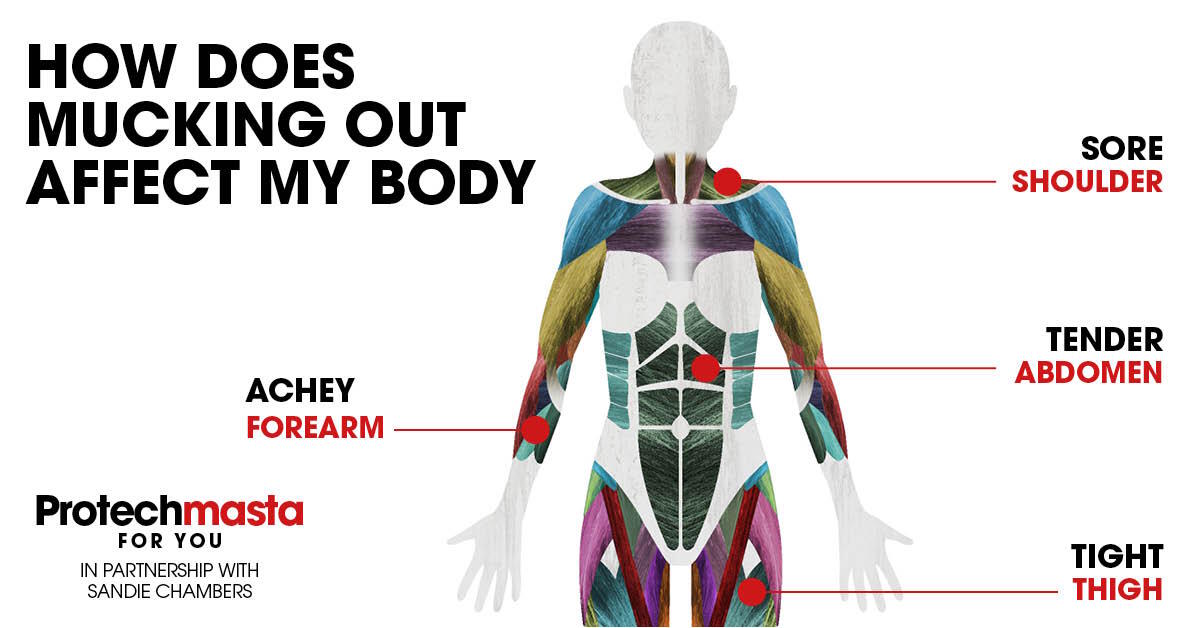
Mucking out. Love it or hate it (does anyone love it?) it’s a job that is best done daily and there is nothing more satisfying than a brand new, sparkly bed to welcome your horse after a long day in the field. We hope our horses appreciate it as much as we appreciate fresh, crisp bed sheets – they do right…?
Now think about it, when you muck out how often do you think about the movements required and how this affects your body? There are a series of discrete angle changes in your joints for example at the wrist, elbow, shoulder back, hip, knee and ankle.
To produce movements safely and to minimise the potential for injury it is important that we’re aware of the muscles and joints required and involved in the task you are about to perform. In an ideal world we’d do a short warm up before mucking out, couple of lunges, shoulder rolls, push ups…you get the idea. But we appreciate this is not possible 99% of the time due to mucking out before work, dashing to do the school run or because it’s raining heavily, and we want to limit the time spent outside so we don’t resemble a drowned rat.

As well as the pressure put on the body while mucking out, additional yard tasks ask a lot of our body such as loading, lifting saddles, feed bags and carting hay bales around. These tasks require a level of muscle condition, strength, power and technique to do safely.
Movements like bending, lifting, loading, flexing and extending are all involved when you’re mucking out, below is a list of body regions commonly put under pressure when you’re shovelling and if like me you never appreciated the strain mucking out can put on your body then read on:
Arms:
During mucking out there is significant load put on the forearm, the load from the shovel + muck is supported by the hand and lower end of the forearm with the elbow joint being the lever involved. Overuse or repeated pressure on the tendons near the elbow joint can overload these tissues, particularly where the tendon anchors to the bone, this causes pain from inflammation of the joint. An example of an injury in this area can be reflected in a shooting pain in the forearm or elbow.
 Shoulder:
Shoulder:
The pec muscles is a prime mover involved in the movement of flexion of the arm and helps with the throwing of muck from the trusty shovel. This muscle can get sore quickly especially if the rotator cuff musclesare weak (a collection of shoulder muscles that help to stabilise, rotate, abduct the shoulder, and all are required for mucking out). Common injuries to the rotator cuffs from mucking out are tears and strains as well as bad posture.
Abdomen:
The trunk of our body is often forgotten yet it helps us to perform a lot movements, such as flexion, extension and lumbar rotation. All these movements are involved in the task of mucking out and it is important to note that if the abdomen muscles are not strong then they cannot support and stabilise your body while mucking out.
Legs:
Important muscles involved in mucking out also include the stabilising muscles of the lower limb:
The key muscles in the leg stabilise the knee and extend the leg during mucking out. While shovelling and sweeping the movement of bending and stepping forward is compromised by the upper body loading, swift movements of disposing of muck and continuous flexing and extending of the trunk.
How can Protechmasta help?
The Protechmasta clothing can help prevent injuries to you while mucking out, doing general yard duties and while riding as it is designed to increase blood flow to the muscles and therefore is of benefit when performing any physical activity or task that requires supple muscles.
So next time your other half or friend complains about the stench of muck following you around, remind them you’ve just had a good workout, oh and mucking out for 10 mins can burn around 70 calories! WIN WIN
We’d love to hear if you are benefitting from wearing Protechmasta – get in touch on Facebook @HarryHallRiding or Instagram @Harry_Hall_Riding
Harry Hall blog written in partnership with Sandie Chambers - Equine and Human Sports Performance Anatomical Scientist and Mental Performance Coach. Sandie is a pioneer and world authority on the use of infrared thermography. Her work assists in identifying and monitoring injuries in the equine and human sports field. With a strong belief in monitoring and preventing injuries, Sandie’s philosophy is directly aligned with the Protechmasta ethos.




The information below is required for social login
Sign In
Create New Account